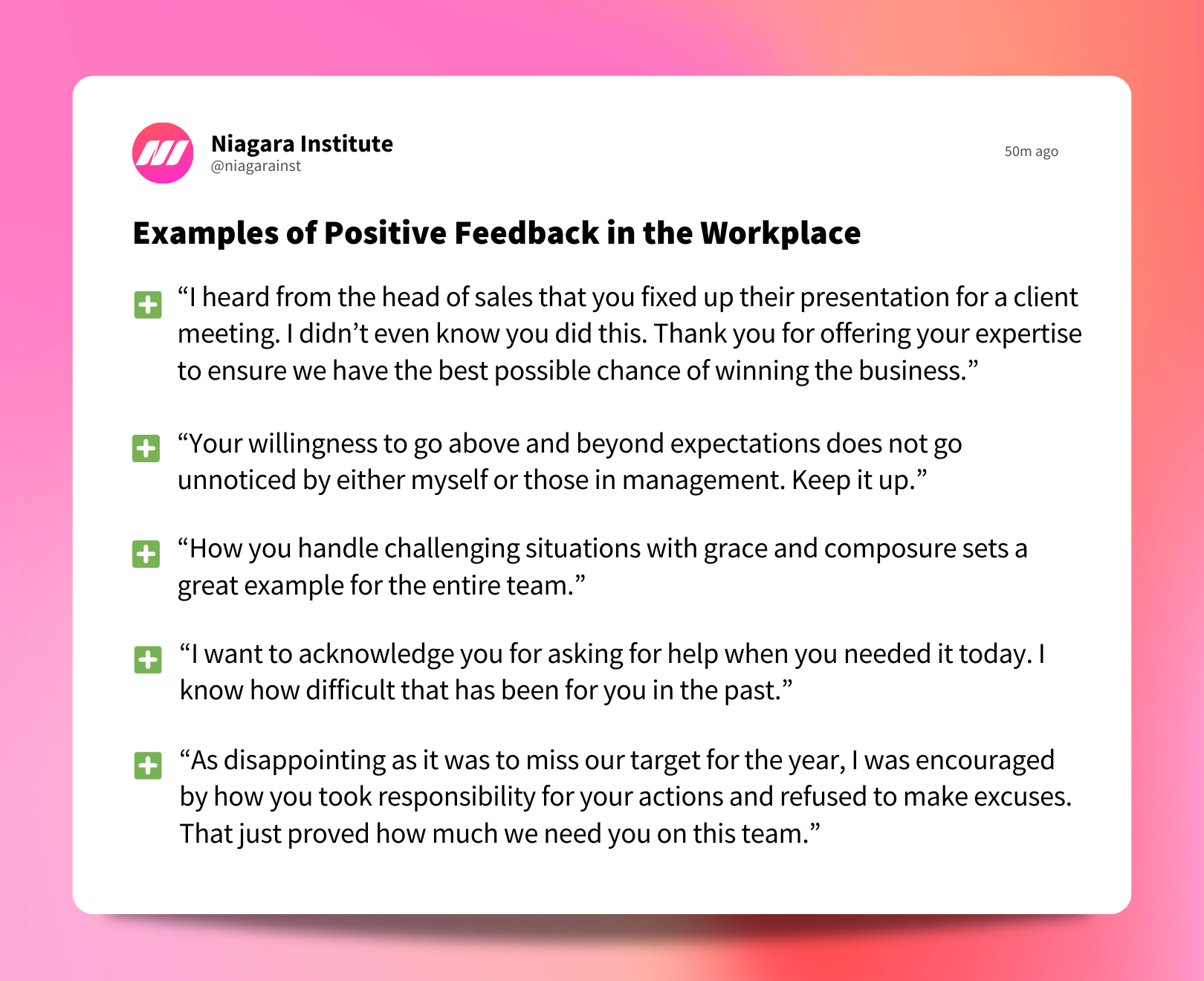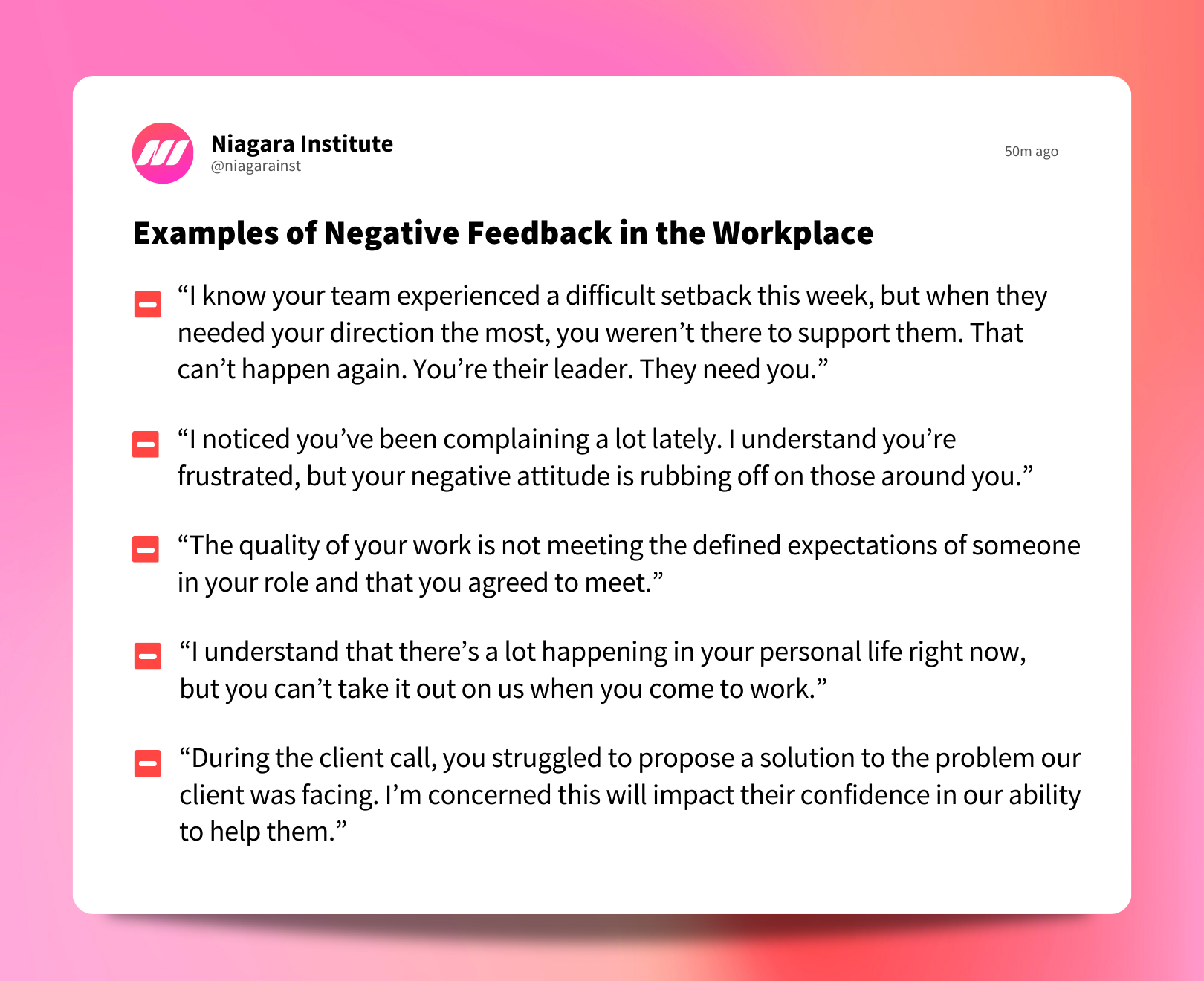When you’re at work, do you want to know where you stand with your boss, peers, or clients? Do you want to see whether you’re doing a good job, and if you’re not, do you want someone to tell you how to get better?
If you do, you want feedback, and you’re not alone. A lot of people crave feedback at work. In fact, according to research by Gallup, people would rather get any feedback - even negative feedback - than be ignored and receive no feedback at all.
Whether you’re looking to give or receive more feedback at work, it’s important that you understand the difference between positive and negative feedback in the workplace. Fortunately, you’ll find a brief and straightforward explanation below, as well as plenty of examples of positive and negative feedback.

Understanding Feedback in the Workplace
Feedback is a critical tool for growth and development in the workplace. It helps employees understand their strengths and areas that need improvement. When used effectively, feedback can foster a culture of learning and collaboration. Both giving and receiving feedback are essential for building a productive and motivated team. Leaders who actively use feedback to improve leadership skills can enhance team dynamics and create an environment where continuous improvement is encouraged.
Importance of Constructive Feedback
Constructive feedback helps employees improve their performance by offering clear, actionable advice. It focuses on specific behaviors or outcomes and provides solutions for improvement. Constructive feedback, delivered in a supportive way, encourages learning and personal growth. It’s key to helping employees reach their full potential without feeling discouraged.
Impact of Feedback on Employee Performance and Morale
Effective feedback can significantly improve employee performance and morale. Positive feedback boosts confidence and self-motivation, while constructive criticism helps individuals grow and develop new skills. When employees feel supported and valued through regular feedback, they are more engaged and productive. A feedback-driven culture contributes to long-term success and a positive work environment.
What’s the Difference Between Positive vs. Negative Feedback?
Feedback is when you offer commentary, insights, or information regarding an individual or group's performance, behavior, or actions. Depending on the nature of the situation, the feedback can be classified as either positive or negative.
The difference between the two is that positive feedback acknowledges and reinforces desirable behaviors, actions, and performance, while negative feedback addresses something that needs to be improved or corrected. Positive feedback reinforces good behavior and motivates individuals to keep performing well.
Think of it this way; if your purpose is to express appreciation, recognize accomplishments, or acknowledge contributions and effort, that’s positive feedback. If your purpose is to address mistakes, failures, or shortcomings and identify areas for improvement, that’s negative feedback. Negative feedback, when delivered thoughtfully, can guide improvement.
Tone and delivery: the tone of feedback plays a huge role in how it's received. Positive feedback should be encouraging and uplifting, while negative feedback should be constructive, not harsh. The way feedback is delivered, whether in a formal or informal setting, also affects its impact. Using a respectful and supportive tone helps ensure that both types of feedback lead to improvement.
Timing and context: the timing of feedback is just as important as its content. Positive feedback should be given soon after a good performance to reinforce the behavior. Negative feedback is most effective when given promptly, but in private and with sensitivity to the situation. Providing feedback in the right context ensures that it’s received well and acted upon.
Impact on future performance: positive feedback boosts confidence and encourages employees to maintain high performance. On the other hand, constructive negative feedback provides clarity on areas of improvement. When delivered correctly, both types of feedback lead to better performance. The goal is to create an environment where employees feel supported in their growth and development.
Positive Feedback Examples
- “During the client call, the way you were able to resolve their issue on the spot was impressive. I know the client appreciated how you were able to find a resolution at the moment.”
- "The quality of your work consistently exceeds expectations, and it's evident that you take pride in what you do."
- "Your dedication to meeting deadlines, even though it meant having to stay late last night, is the reason we were able to submit that proposal on time today. I can’t thank you enough. I hope you’ll leave early today if you can to make up for that time.”
- “The way you are able to make every single person on this team feel heard and seen is awe-inspiring. You make others want to be part of this team.”
- “I can always count on you to participate fully in our weekly team meetings. It makes my job so much easier as the meeting facilitator, so thank you.”
- “I heard from the head of sales that you fixed up the presentation they used in their meeting with their new prospective client this week. I didn’t even know you did this. Thank you for offering your expertise to ensure we have the best possible chance of winning the business.”
- “The way you took charge of the situation and stepped up as a leader today was commendable. I want to find you opportunities to do that more because you clearly have the makings of a great leader.”
- "Your willingness to go above and beyond expectations does not go unnoticed by either myself or those in management. Keep it up.”
- "How you handle challenging situations with grace and composure sets a great example for the entire team."
- “If it weren’t for you offering to help our colleagues, we never would have hit our deadline for the client. They’re immensely grateful for it, and I'm impressed by your willingness to do that. Not everyone would have, and I recognize that.”
- “Thanks to your ability to think outside the box, we settled a long-standing point of contention between our teams today. That’s huge. You should be very proud.”
- “I want to acknowledge you for asking for help when you needed it today. I know how difficult that has been for you in the past.”
- “When you walk in here every day, you embody the values of our team and our organization. It’s something that your colleagues admire, and I appreciate.”
- "Your positive attitude and enthusiasm are contagious. You’re able to boost morale, even when I think it’s not possible. That is an enviable trait.”
- “That was an impossible situation, and yet, you handled it with such professionalism. You’re a real asset to this organization.”
- “When our new team members started, I couldn’t give them my full attention. You took them under your wing and ensured they had everything they needed and more. They wouldn’t be where they are now without you. Thank you.”
- "Your ability to adapt to change and embrace new ideas is something the entire team looks up to you for.”
- “I was impressed when you spoke up during the team meeting. I know public speaking isn’t your favorite thing, but today, you spoke like a true leader. It really drove your message home.”
- “You’ve set an intense stretch goal for yourself this year. Undoubtedly, it will be a challenge to achieve, but I have confidence in you and will be here to support you as best I can.”
- “As disappointing as it was to miss our target for the year, I was encouraged by how you took responsibility for your actions and refused to make excuses. That just proved how much we need you on this team.”

Negative Feedback Examples
- “During the client call, you struggled to propose a solution to the problem our client was facing. I’m concerned this will impact their confidence in our ability to help them.”
- "The quality of your work is not meeting the defined expectations of someone in your role and that you agreed to meet."
- "This is the second time you have missed a deadline without any warning or explanation. As I mentioned previously, if you’re concerned about whether or not you are going to make your deadline, you need to communicate that with me at least 24 hours ahead of time.”
- “I know you’re making an effort to improve your time management skills, but I need you to accelerate your progress as a member of management made a comment about your tardiness to a meeting the other day.”
- “Our daily team huddles require everyone’s full attention and active participation, which isn’t something you’ve been giving the last few weeks.”
- “I just heard that our head of sales emailed you a question last week, to which you never responded. As you can imagine, this was frustrating for them and reflected poorly on you, me, and our team.”
- “I know your team experienced a difficult setback this week, but when they needed your direction the most, you weren’t there to support them. That can’t happen again. You’re their leader, and they need you to be present during those tough moments.”
- “I understand that there’s a lot happening in your personal life right now, but you can’t take it out on us when you come to work.”
- "The next time you’re in a challenging situation like that, I’d appreciate it if you could make more of an effort to keep your composure. It’s difficult to want to help you when you lose it like you did.”
- “I noticed that while the rest of the team worked together to finish that project on time last week, you didn’t check in or offer to help. We’re a team, and we can’t stand by and watch another struggle or fail, so you have to be aware of when it’s time to stop what you’re doing and pitch in for the good of the team.”
- “This conflict between us has gone on too long, and now it’s impacting our ability to do our work. I’m ready to settle it, but I need you to be more willing to compromise with me. We’ll both have to give a little, but in the end, it means we’ll be able to move on.”
- “I think you had an opportunity to ask for help today. I know how difficult this is for you, but I encourage you to lean on the team when you’re overwhelmed or struggling.”
- “Our team and organization’s core values are meant to be guideposts. Your words and actions should align with them, and to date, they haven’t.”
- "I notice you’ve been complaining a lot lately. I understand you’re frustrated, but your negative attitude is rubbing off on those around you.”
- “I’m concerned by your inability to take responsibility for your actions and the part you played in this mistake.”
- “I’ve repeatedly caught and alerted you to the same mistake in all the documents you sent me. It’s frustrating having to fix it myself every time. Please make more of a conscious effort to correct it yourself.”
- "Your inability to adapt to embrace the new changes mandated by management is hurting our team’s morale and ability to function. While I was understanding at the beginning, we’re at the point now where that has to change.”
- “I realize that public speaking is something you struggle with, but you have valid points that I think the team needs to hear. I want you to contribute at least once during our next meeting.”
- “I admire your willingness to set stretch goals, but I’m concerned the one you put forth for next year is unrealistic, and I don’t want to set you up for failure. Let’s revise it together.”
- “I was disappointed that we missed our target for the year, but I was even more disappointed by just how quickly you were to place blame. It’s important each and every one of us recognize and accept our part in that failure, including you.”


 Michelle Bennett
:
Oct 1, 2023 5:00:00 AM
Michelle Bennett
:
Oct 1, 2023 5:00:00 AM





